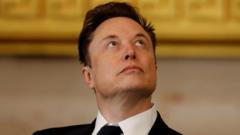As TikTok faces potential bans due to its Chinese ownership, several prominent figures, including Elon Musk, MrBeast, and Larry Ellison, have emerged as potential buyers, raising questions about the platform's future.
**Potential Buyers Emerge for TikTok as Pressure Mounts for Sale**

**Potential Buyers Emerge for TikTok as Pressure Mounts for Sale**
Billionaire entrepreneurs and political figures express interest in acquiring the popular social media platform amid regulatory scrutiny.
In a whirlwind of speculation and excitement, TikTok's future hangs in the balance as a growing list of high-profile individuals expresses interest in acquiring the platform embroiled in political controversy. Among them is billionaire entrepreneur Elon Musk, who is notably affiliated with former President Donald Trump, adding a layer of intrigue to the ongoing situation.
Famed internet personality Jimmy Donaldson, known as MrBeast, recently shared his enthusiasm with his millions of TikTok followers about his intention to potentially purchase the app. Streaming from a private jet, he declared, "I might become you guys' new CEO! I'm super excited!" His post has captivated over 73 million viewers since its release earlier this week. Although he withheld specific details about his offer, he promised that his plans would be "crazy."
The discussions surrounding TikTok's acquisition come amidst a politically charged climate following legislation passed under the Biden administration. The law mandates that TikTok's China-based parent company, ByteDance, must sell the company or face a U.S. ban by January 19. This legislation responded to rising concerns over national security and the app's ties to the Chinese government.
Former President Trump has weighed in on the matter, suggesting a potential joint venture for U.S. ownership of TikTok. He proclaimed on Truth Social: "I would like the United States to have a 50% ownership position." He has made moves to keep TikTok operational for an additional 75 days, allowing time for potential negotiations.
This week, it was reported that China is contemplating a sale to Musk, who already owns the social media platform X. Musk recently tweeted that the disparity between the operation of TikTok in the U.S. while X remains unavailable in China is "unbalanced." Trump seemed agreeable to the thought of Musk acquiring TikTok, indicating, "I would be if he wanted to buy it."
Another notable suitor is Larry Ellison, chairman of Oracle, who has long been a supporter of Trump. Oracle has served as TikTok's primary server provider, and Ellison's involvement could facilitate a smoother transition if the acquisition proceeds. He previously stated concerns that a ban could adversely affect Oracle's business.
Billionaire investor Frank McCourt has also declared interest and has proposed that TikTok be free from its proprietary algorithm in a bid to ensure better data practices. McCourt aims to run the app under the auspices of his Project Liberty Institute.
Georgetown Law professor Anupam Chander believes that Trump’s ongoing influence will shape the selection of TikTok's buyer. He remarked that any ownership model must align with the law's parameters and criticized the Biden administration for giving such significant control to the presidency over a major information platform.
As negotiations and discussions continue amidst the political and regulatory storm, TikTok's fate remains uncertain, and observers are left to wonder who will ultimately take the reins of the application's future.
Famed internet personality Jimmy Donaldson, known as MrBeast, recently shared his enthusiasm with his millions of TikTok followers about his intention to potentially purchase the app. Streaming from a private jet, he declared, "I might become you guys' new CEO! I'm super excited!" His post has captivated over 73 million viewers since its release earlier this week. Although he withheld specific details about his offer, he promised that his plans would be "crazy."
The discussions surrounding TikTok's acquisition come amidst a politically charged climate following legislation passed under the Biden administration. The law mandates that TikTok's China-based parent company, ByteDance, must sell the company or face a U.S. ban by January 19. This legislation responded to rising concerns over national security and the app's ties to the Chinese government.
Former President Trump has weighed in on the matter, suggesting a potential joint venture for U.S. ownership of TikTok. He proclaimed on Truth Social: "I would like the United States to have a 50% ownership position." He has made moves to keep TikTok operational for an additional 75 days, allowing time for potential negotiations.
This week, it was reported that China is contemplating a sale to Musk, who already owns the social media platform X. Musk recently tweeted that the disparity between the operation of TikTok in the U.S. while X remains unavailable in China is "unbalanced." Trump seemed agreeable to the thought of Musk acquiring TikTok, indicating, "I would be if he wanted to buy it."
Another notable suitor is Larry Ellison, chairman of Oracle, who has long been a supporter of Trump. Oracle has served as TikTok's primary server provider, and Ellison's involvement could facilitate a smoother transition if the acquisition proceeds. He previously stated concerns that a ban could adversely affect Oracle's business.
Billionaire investor Frank McCourt has also declared interest and has proposed that TikTok be free from its proprietary algorithm in a bid to ensure better data practices. McCourt aims to run the app under the auspices of his Project Liberty Institute.
Georgetown Law professor Anupam Chander believes that Trump’s ongoing influence will shape the selection of TikTok's buyer. He remarked that any ownership model must align with the law's parameters and criticized the Biden administration for giving such significant control to the presidency over a major information platform.
As negotiations and discussions continue amidst the political and regulatory storm, TikTok's fate remains uncertain, and observers are left to wonder who will ultimately take the reins of the application's future.























